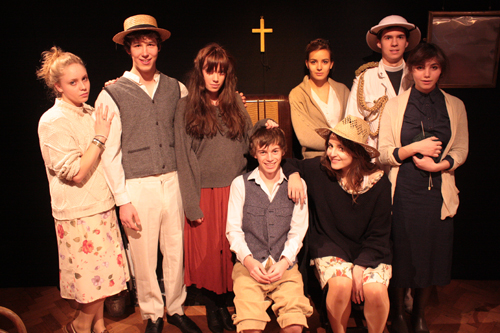Irish dancing at St. Clare's
Those who didn't come to see
Dancing at Lughnasa by Brian Friel put on by the second year
Theatre Students this week missed a real treat. The familiar main hall was turned with a few choice
props - a fine old radio, a basket of laundry and a coat rack - into rural Ireland of the 1930s, where five
sisters live out lives hemmed in by prejudice and Catholic strictures. Social barriers, ostracism, lack of
money or prospects of marriage contribute to a sense of wasted lives, yet the mood is joyful. Singing and dancing,
rituals of daily life and a warm sense of the family group give a sense of people making the best of the cards they
have been dealt. Brian Friel creates a world through the eyes of the grown up Michael (Mathias Ban de Kerckhove)
remembering his kite-making youth.
The show was carried by the group of sisters, whose supportive ensemble playing showed the benefit of many hours
rehearsal under the direction of Victoria Watson. Transitions from domesticity to playfulness to tragic reflections
were subtly handled. All acted well, especially Antonia Desplat, as the oldest sister who keeps the household
together by her income as a schoolteacher and by her code of propriety. Antonia played the part with a fine balance
of dignity and tenderness and a beautiful sense of timing in her delivery. Giulietta Tisminetzky playing the feeble
minded Rosa, injected a delightful joy and spontaneity, especially in the dancing scenes. Aleksandra Paciorek played
Chris, mother of the illegitimate Michael (Mathias), whose existence has damaged the family reputation and will maybe
lead to Kate losing her job. Tara Babovic and Marina Norman were also convincing as the sisters who keep life going,
with moods of depression alternating with delight at the pleasure of dancing or music.
Friel evokes a world dominated by women, because the eligible men have emigrated. Kajetan Waluszewski was the
charming but unreliable father of the illegitimate child, a smooth dancer, full of empty boasts and promises of
gifts. Even less able to earn a living was Jack, played by Sergey Gostev. The oldest son, returned from years
as a missionary priest in Africa, he has picked up more than malaria from his experiences. His confused wanderings
and loss of memory were tragic, as was his touching reconnecting with his old life.
Though the idiomatic phrasing was sometimes lost, the feeling of the play came over well. Well-chosen music and
careful lighting created a powerful atmosphere. The young actors managed to convey the sweetness and sadness of
nostalgia for a world none of us knew, but were all more able to imagine having seen the play.

March
 March
March




